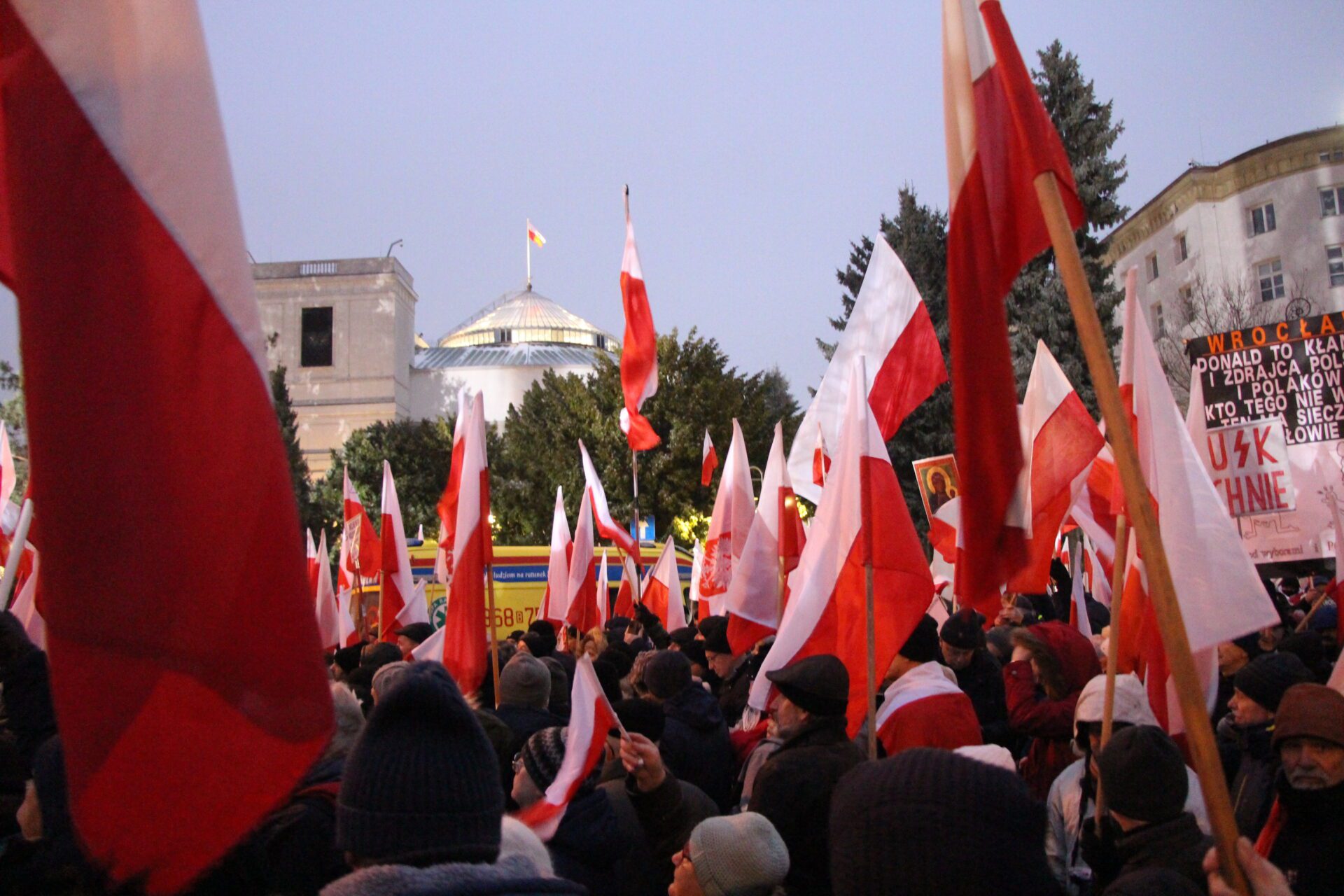The state of the coup by the liberal left in Poland: a positional war

Last week’s attempt by MPs Kamiński and Wąsik to force their way into the Sejm, where Speaker Szymon Hołownia has ruled their mandates to have expired – illegally, considering the decision of the only authorized chamber of the Supreme Court – raises the suspicion that the Law and Justice party (PiS) is trying to copy the behavior of its opponents eight years ago. This is a bad and counterproductive strategy for an opposition party, resulting from a misreading of public sentiment and an incorrect prediction of Donald Tusk’s further steps.
Rafał Ziemkiewicz
Everything indicates that the Law and Justice party (PiS) is assuming, without allowing for any other possibility, that Donald Tusk will try at all costs to break the deadlock in which he found himself with his ‘restoration of the rule of law’, which began with Sienkiewicz’s gangster-like entry into TVP and PAP and Bodnar’s subsequent attack on the prosecutors’ offices. As Tusk himself announced (‘a few days of settling accounts and then time for a national reconciliation’), this was supposed to be a ‘blitzkrieg’ operation, but the ministers involved proved so inept that the planned changes got bogged down somewhere along the way. The state media are under the control of ‘liquidators’, who have been denied registration in the National Court Register and access to viewers’ license fees; the ‘acting’ prosecutor sends faxes from the minister’s office with various appointments and dismissals (the real office still being occupied by a prosecutor whom Bodnar considers ‘suspended’); the minister dismisses court heads, who are in turn reinstated by the Constitutional Court… Pilsudski’s blunt description of democratic politics as a ‘crappy mess’ has never been more apt than in recent weeks.
From Poland’s ombudsman to Donald Tusk’s justice minister: The downfall of Adam Bodnar
A WAR OF THE CLANS
What is not at all apparent, however, is any determination on Donald Tusk’s part to act more radically – to use the police and army to enforce obedience to his appointees, to follow through on his warnings of forcible entry into the Constitutional Tribunal and the National Bank of Poland and to remove resistant judges by force. PiS seems to interpret this as a sign of weakness, whereby Tusk obviously overestimated his strength, he did not foresee such public resistance and has reached a red line that he does not dare to cross. If so, the resistance will have to be intensified, and then Tusk will have to step back.
It is likely that Tusk was hoping for stronger support, especially in legal circles. For eight years the leaders of the legal insurgency had been persuading the left-liberal opposition politicians – and themselves – that they represented the whole legal community and that there were at most a handful of ‘PiS appointees’ against them – until they came to believe in this themselves. Facts such as the above-mentioned decisions of the registrars of the National Court Register, the objection of the Warsaw Court of Appeal council to the dismissal of President Schab, or the resistance throughout the country to Bodnar’s ‘acting prosecutors’ may come as an unpleasant surprise to those currently in power. But the weaker-than-expected support for restoring the rule of law ‘utilizing methods of a police state’ (which, let us recall, Tusk had been urged to do by the German press even before he formed his government) may not be the only reason why he has so far decided not to escalate his coup d’état.
PiS seems to have failed to notice that contrary to a common expectation among its supporters, Tusk’s ‘unorthodox legal tactics’ (the Financial Times’ term) have had virtually no effect on political preferences at the polls. The average Pole does not necessarily support the obvious thuggery in the media and the prosecutor’s office (as for the former, the ‘TV remote vote’ was significant, especially as concerns TVP after the government’s forcible takeover resulted in a dramatic drop in viewership), nor is he necessarily outraged by it, at any rate not so much as to draw practical conclusions from that outrage. (…)
If, on the other hand, the polls accurately reflect the mood and the ruling camp did not suffer any significant image losses because of the collapse of the first offensive, is there any reason to continue further at any cost? There is probably a line to be drawn somewhere which, if crossed, would make voters change their minds. Perhaps it is the open involvement of the state apparatus of coercion in the party dispute – and perhaps for this too, Tusk would be forgiven. But is it worth it for him to test this out two months before the local elections and four months before the European Parliament elections? Or is it better, from the PO leader’s point of view, to muddle through these few months in the chaos created at the beginning of his term in office and later launch another offensive only after taking over the local governments – which is almost certain, since PiS, with its zero coalition-forming capacity, has no chance of staying in power in more than one voivodship and a few small towns – and then expanding his party’s position in the European Parliament? (This time it is doubtful that the PO will hand over any of its hard-won European mandates to the Left, as former PO leader Schetyna unwisely did in the last elections.)
THE KEY TO CHANGE
Since the ‘blitzkrieg’ operation has failed, it’s necessary to dig in and move on to ‘positional warfare’. The military metaphor is a bit out of place here because, unlike real clashes, political wars are primarily about making an impression on the arbiter of the conflict – in this case, the voter. This impression should be: ‘it’s not us, it’s them’. One of the ways to achieve this goal is to provoke the opponent into aggressive behavior, and here Tusk has repeatedly proved his effectiveness, reinforced by the power of his propaganda apparatus (…).
Can the Right regain power in Poland after losing the battle for the public media? (Interview)
Actions like last week’s brawl outside the Sejm actually serve Tusk quite well. They confirm the average voter’s belief that even if the PO is not playing fair and square, ‘one group is as bad as the other’, and above all – that this dispute between the parties does not concern ordinary Poles. In a very interesting and recommendable piece by Kacper Kita, ‘Stan wojenny, którego nie będzie’ (transl.: The martial law that won’t be), recently published on the nlad.pl website, the author posits that the key to changing party ratings is for the opposition to convince voters that they are losing out under Tusk’s rule. The key to reversing the public sentiment that has elevated the current government is therefore to focus the message on issues that affect citizens: the consequences of the government’s subservience to the EU and Berlin, its agreement to drain Poland of its resources by abandoning investments and negotiating climate policy, its openness to the forced resettlement of illegal immigrants, and the likely collapse of the budget as a result of reduced effectiveness of collection of VAT and other taxes.
It logically follows that for Tusk, the key to maintaining public acquiescence is to channel PiS activity into actions that are perceived as defending that party’s positions. Rather than escalating lawlessness, it is more profitable for him to return to Ostachowicz’s tactic of ‘rattling the cage’, in which he has considerable experience and to which PiS is always susceptible. At moments when the government is about to make further concessions that it doesn’t even bother to inform Poles about (our knowledge about Tusk’s agreement to common EU taxes, the withdrawal of climate cases from the ECJ or the promise to Germany to stop regulatory work on the Oder River comes from EU officials, Reuters and German newspapers), more blows can be expected against Wąsik and Kamiński, the Constitutional Tribunal and law-abiding prosecutors. But these will not be blows to really break them, because that would require serious forces; the only point will be for PiS to continue its marching, picketing, protesting and generation of media coverage that meets the expectations of those in power.
THE SHORT-SIGHTEDNESS OF PiS
In the case of Wąsik and Kamiński, for example, it would have been wiser – despite all the substantive reasons in their favor – to persuade them to give up their mandates as a gesture of goodwill and for the good of the country, and to demand that the legality of the Sejm’s work not be undermined. (…) Only that the PiS party still does not see beyond its ‘most loyal electorate’ and wants above all to fulfill their expectations – it is not clear why, because the ‘most loyal’ electorate is called most loyal precisely because it will forgive the party everything and will never turn away from it.
Meanwhile, of course, Tusk would prefer to have full power in all the areas that the law leaves in the hands of people elected in previous terms – but the ‘crappy mess’ over the next few months, or even longer, is a situation that is bearable for him. It must be remembered that he is governing Poland against the backdrop of EU expectations, and from this point of view the chaos in the country is an asset, not a liability, for it means that Poland will in any case be unable to resist the policy of centralization and exploitation of the periphery by the Franco-German tandem and that ultimately Polish affairs will be decided outside of Poland. This means a worst-case scenario in which, returning to the military metaphor, the positional war will continue for a very long time. Why? Because the PO does not have to come out of its trenches and PiS seems unable to leave its own.
This article was first published in Polish in the Do Rzeczy weekly in February 2024.



